HSC203 Indigenous Health: Analyzing a Health Journey Narrative
VerifiedAdded on 2023/04/11
|6
|1418
|246
Essay
AI Summary
This essay explores the health journey of an Indigenous Australian, focusing on the impact of health issues on the individual, family, and community. It highlights the disparities in health outcomes between Indigenous and non-Indigenous Australians, particularly concerning chronic diseases like Chronic Kidney Disease (CKD). The narrative emphasizes the role of education in improving health literacy and promoting healthier lifestyles, referencing the case of Yothu Yindi, an Indigenous musician who suffered from CKD. The essay discusses the importance of addressing social determinants of health and promoting culturally sensitive healthcare approaches to improve the health and well-being of Indigenous communities. It concludes that enhanced education and awareness are crucial for bridging the health gap and ensuring equitable access to healthcare services for Indigenous Australians. Desklib provides access to similar essays and study resources for students.
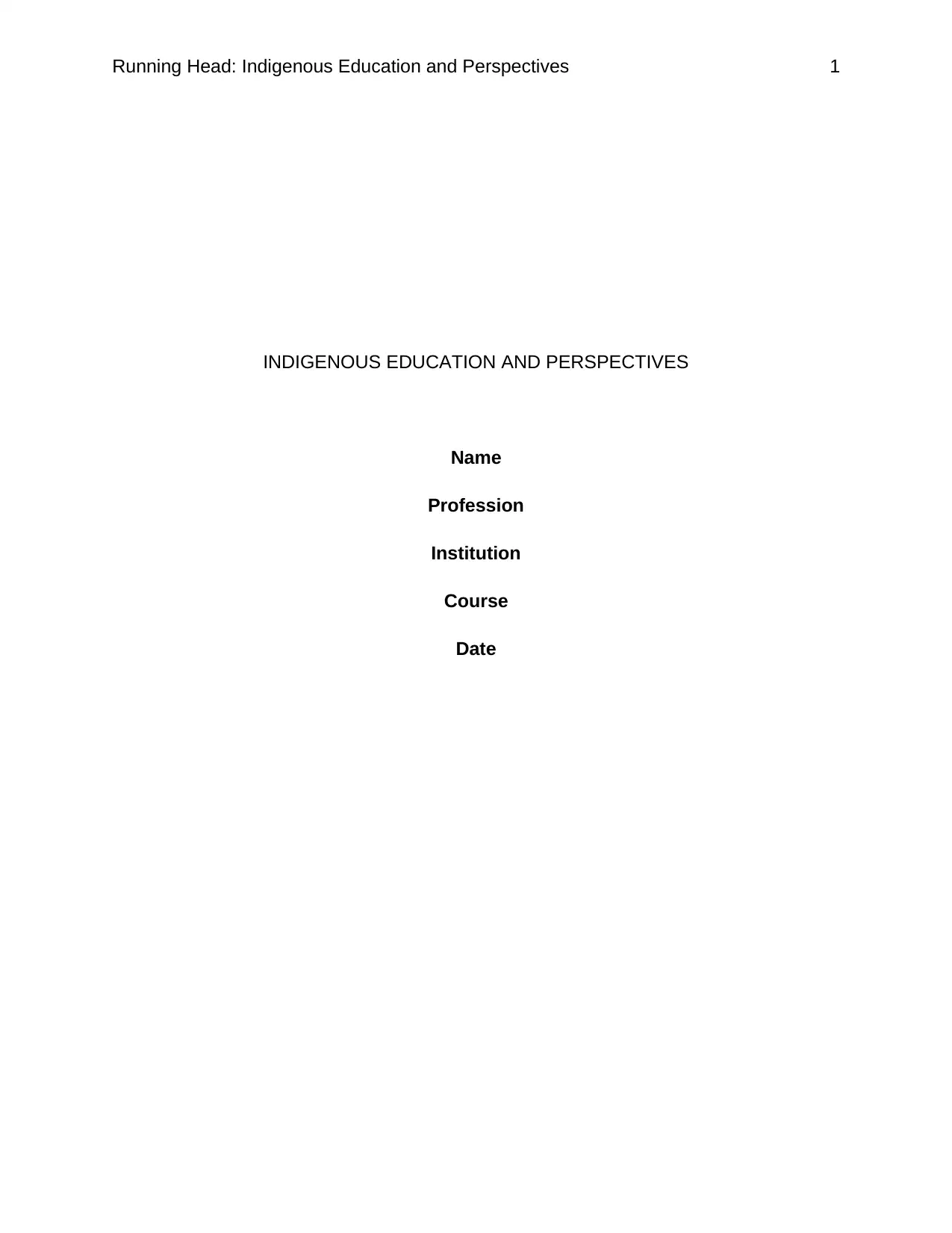
Running Head: Indigenous Education and Perspectives 1
INDIGENOUS EDUCATION AND PERSPECTIVES
Name
Profession
Institution
Course
Date
INDIGENOUS EDUCATION AND PERSPECTIVES
Name
Profession
Institution
Course
Date
Paraphrase This Document
Need a fresh take? Get an instant paraphrase of this document with our AI Paraphraser
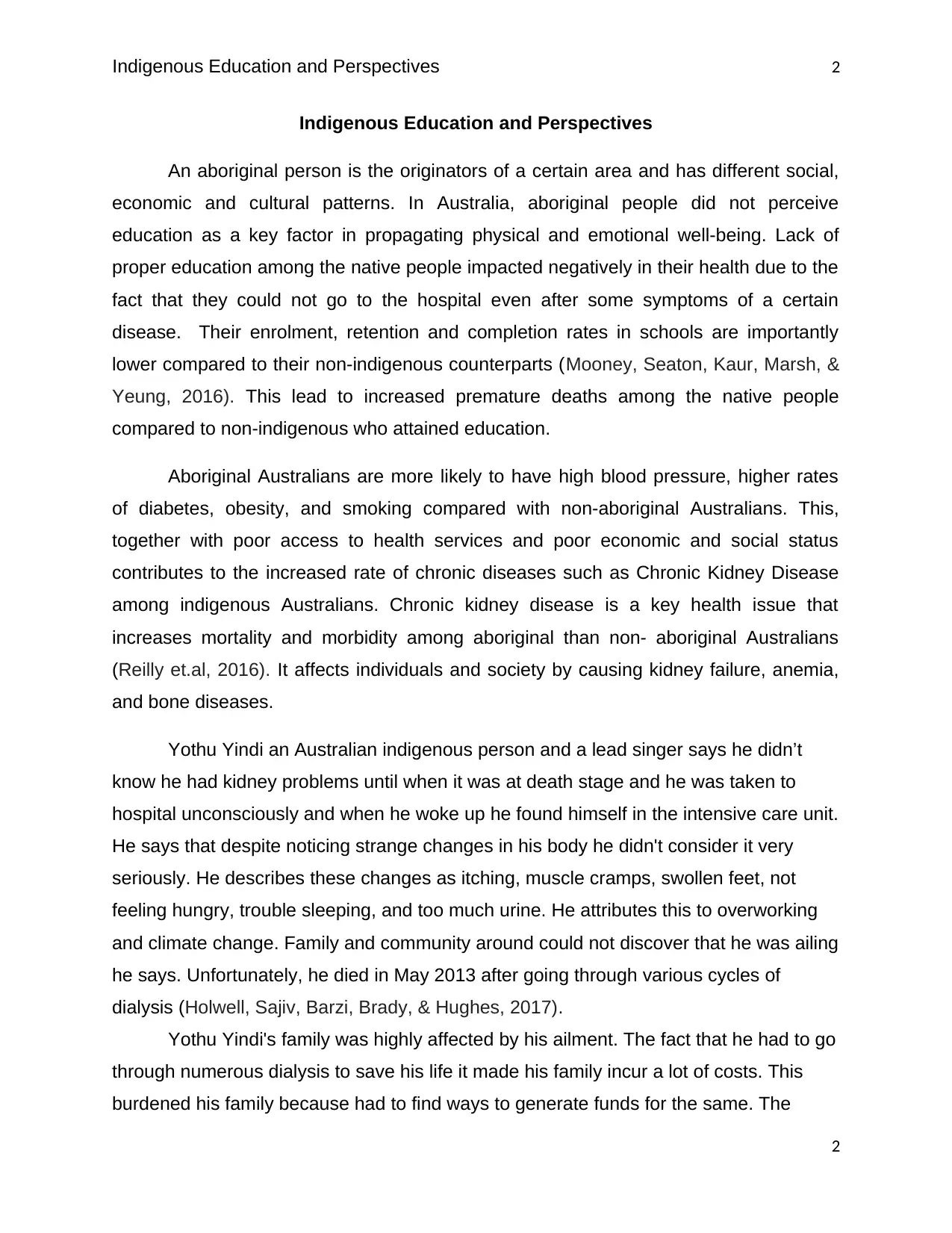
Indigenous Education and Perspectives 2
Indigenous Education and Perspectives
An aboriginal person is the originators of a certain area and has different social,
economic and cultural patterns. In Australia, aboriginal people did not perceive
education as a key factor in propagating physical and emotional well-being. Lack of
proper education among the native people impacted negatively in their health due to the
fact that they could not go to the hospital even after some symptoms of a certain
disease. Their enrolment, retention and completion rates in schools are importantly
lower compared to their non-indigenous counterparts (Mooney, Seaton, Kaur, Marsh, &
Yeung, 2016). This lead to increased premature deaths among the native people
compared to non-indigenous who attained education.
Aboriginal Australians are more likely to have high blood pressure, higher rates
of diabetes, obesity, and smoking compared with non-aboriginal Australians. This,
together with poor access to health services and poor economic and social status
contributes to the increased rate of chronic diseases such as Chronic Kidney Disease
among indigenous Australians. Chronic kidney disease is a key health issue that
increases mortality and morbidity among aboriginal than non- aboriginal Australians
(Reilly et.al, 2016). It affects individuals and society by causing kidney failure, anemia,
and bone diseases.
Yothu Yindi an Australian indigenous person and a lead singer says he didn’t
know he had kidney problems until when it was at death stage and he was taken to
hospital unconsciously and when he woke up he found himself in the intensive care unit.
He says that despite noticing strange changes in his body he didn't consider it very
seriously. He describes these changes as itching, muscle cramps, swollen feet, not
feeling hungry, trouble sleeping, and too much urine. He attributes this to overworking
and climate change. Family and community around could not discover that he was ailing
he says. Unfortunately, he died in May 2013 after going through various cycles of
dialysis (Holwell, Sajiv, Barzi, Brady, & Hughes, 2017).
Yothu Yindi's family was highly affected by his ailment. The fact that he had to go
through numerous dialysis to save his life it made his family incur a lot of costs. This
burdened his family because had to find ways to generate funds for the same. The
2
Indigenous Education and Perspectives
An aboriginal person is the originators of a certain area and has different social,
economic and cultural patterns. In Australia, aboriginal people did not perceive
education as a key factor in propagating physical and emotional well-being. Lack of
proper education among the native people impacted negatively in their health due to the
fact that they could not go to the hospital even after some symptoms of a certain
disease. Their enrolment, retention and completion rates in schools are importantly
lower compared to their non-indigenous counterparts (Mooney, Seaton, Kaur, Marsh, &
Yeung, 2016). This lead to increased premature deaths among the native people
compared to non-indigenous who attained education.
Aboriginal Australians are more likely to have high blood pressure, higher rates
of diabetes, obesity, and smoking compared with non-aboriginal Australians. This,
together with poor access to health services and poor economic and social status
contributes to the increased rate of chronic diseases such as Chronic Kidney Disease
among indigenous Australians. Chronic kidney disease is a key health issue that
increases mortality and morbidity among aboriginal than non- aboriginal Australians
(Reilly et.al, 2016). It affects individuals and society by causing kidney failure, anemia,
and bone diseases.
Yothu Yindi an Australian indigenous person and a lead singer says he didn’t
know he had kidney problems until when it was at death stage and he was taken to
hospital unconsciously and when he woke up he found himself in the intensive care unit.
He says that despite noticing strange changes in his body he didn't consider it very
seriously. He describes these changes as itching, muscle cramps, swollen feet, not
feeling hungry, trouble sleeping, and too much urine. He attributes this to overworking
and climate change. Family and community around could not discover that he was ailing
he says. Unfortunately, he died in May 2013 after going through various cycles of
dialysis (Holwell, Sajiv, Barzi, Brady, & Hughes, 2017).
Yothu Yindi's family was highly affected by his ailment. The fact that he had to go
through numerous dialysis to save his life it made his family incur a lot of costs. This
burdened his family because had to find ways to generate funds for the same. The
2
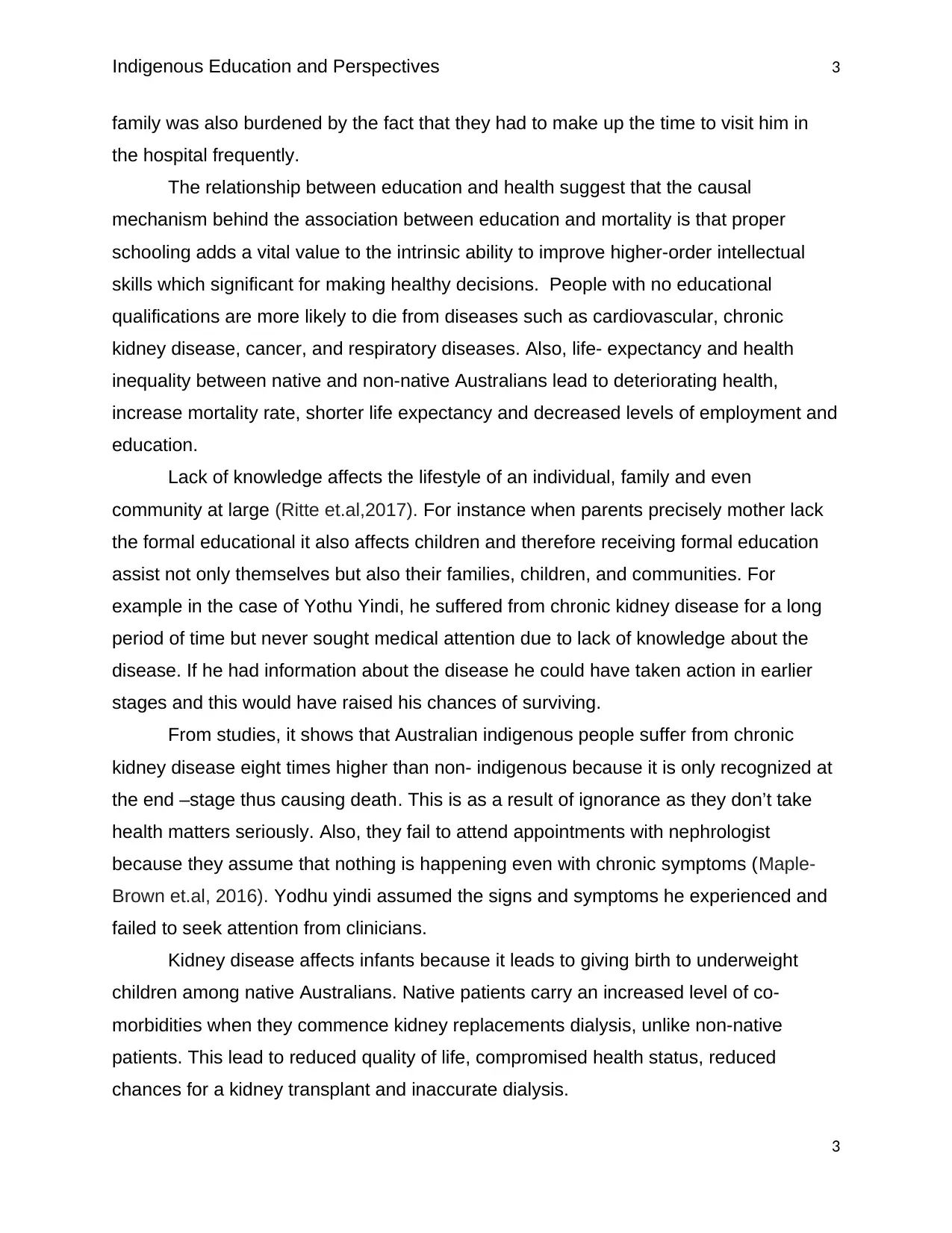
Indigenous Education and Perspectives 3
family was also burdened by the fact that they had to make up the time to visit him in
the hospital frequently.
The relationship between education and health suggest that the causal
mechanism behind the association between education and mortality is that proper
schooling adds a vital value to the intrinsic ability to improve higher-order intellectual
skills which significant for making healthy decisions. People with no educational
qualifications are more likely to die from diseases such as cardiovascular, chronic
kidney disease, cancer, and respiratory diseases. Also, life- expectancy and health
inequality between native and non-native Australians lead to deteriorating health,
increase mortality rate, shorter life expectancy and decreased levels of employment and
education.
Lack of knowledge affects the lifestyle of an individual, family and even
community at large (Ritte et.al,2017). For instance when parents precisely mother lack
the formal educational it also affects children and therefore receiving formal education
assist not only themselves but also their families, children, and communities. For
example in the case of Yothu Yindi, he suffered from chronic kidney disease for a long
period of time but never sought medical attention due to lack of knowledge about the
disease. If he had information about the disease he could have taken action in earlier
stages and this would have raised his chances of surviving.
From studies, it shows that Australian indigenous people suffer from chronic
kidney disease eight times higher than non- indigenous because it is only recognized at
the end –stage thus causing death. This is as a result of ignorance as they don’t take
health matters seriously. Also, they fail to attend appointments with nephrologist
because they assume that nothing is happening even with chronic symptoms (Maple-
Brown et.al, 2016). Yodhu yindi assumed the signs and symptoms he experienced and
failed to seek attention from clinicians.
Kidney disease affects infants because it leads to giving birth to underweight
children among native Australians. Native patients carry an increased level of co-
morbidities when they commence kidney replacements dialysis, unlike non-native
patients. This lead to reduced quality of life, compromised health status, reduced
chances for a kidney transplant and inaccurate dialysis.
3
family was also burdened by the fact that they had to make up the time to visit him in
the hospital frequently.
The relationship between education and health suggest that the causal
mechanism behind the association between education and mortality is that proper
schooling adds a vital value to the intrinsic ability to improve higher-order intellectual
skills which significant for making healthy decisions. People with no educational
qualifications are more likely to die from diseases such as cardiovascular, chronic
kidney disease, cancer, and respiratory diseases. Also, life- expectancy and health
inequality between native and non-native Australians lead to deteriorating health,
increase mortality rate, shorter life expectancy and decreased levels of employment and
education.
Lack of knowledge affects the lifestyle of an individual, family and even
community at large (Ritte et.al,2017). For instance when parents precisely mother lack
the formal educational it also affects children and therefore receiving formal education
assist not only themselves but also their families, children, and communities. For
example in the case of Yothu Yindi, he suffered from chronic kidney disease for a long
period of time but never sought medical attention due to lack of knowledge about the
disease. If he had information about the disease he could have taken action in earlier
stages and this would have raised his chances of surviving.
From studies, it shows that Australian indigenous people suffer from chronic
kidney disease eight times higher than non- indigenous because it is only recognized at
the end –stage thus causing death. This is as a result of ignorance as they don’t take
health matters seriously. Also, they fail to attend appointments with nephrologist
because they assume that nothing is happening even with chronic symptoms (Maple-
Brown et.al, 2016). Yodhu yindi assumed the signs and symptoms he experienced and
failed to seek attention from clinicians.
Kidney disease affects infants because it leads to giving birth to underweight
children among native Australians. Native patients carry an increased level of co-
morbidities when they commence kidney replacements dialysis, unlike non-native
patients. This lead to reduced quality of life, compromised health status, reduced
chances for a kidney transplant and inaccurate dialysis.
3
⊘ This is a preview!⊘
Do you want full access?
Subscribe today to unlock all pages.

Trusted by 1+ million students worldwide
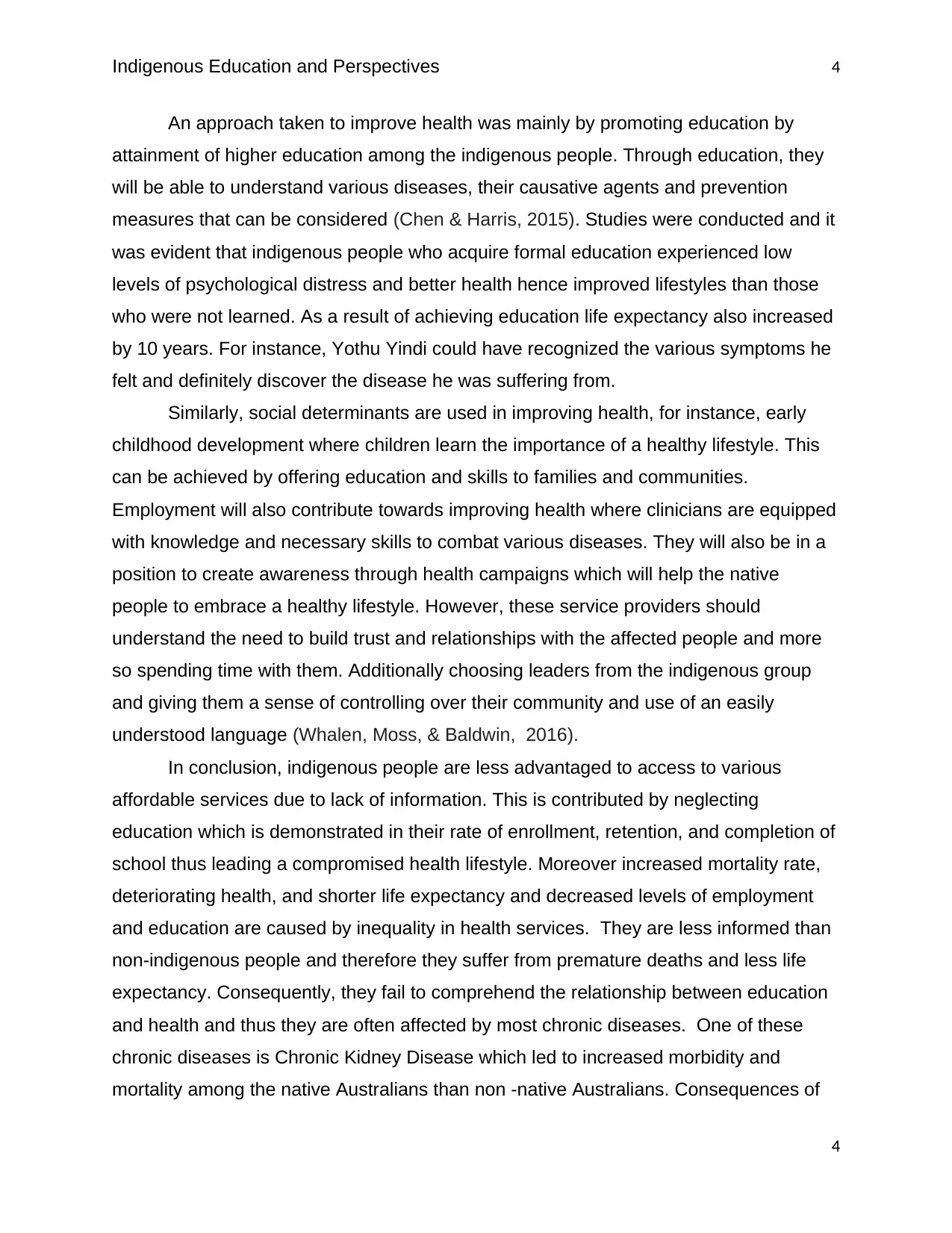
Indigenous Education and Perspectives 4
An approach taken to improve health was mainly by promoting education by
attainment of higher education among the indigenous people. Through education, they
will be able to understand various diseases, their causative agents and prevention
measures that can be considered (Chen & Harris, 2015). Studies were conducted and it
was evident that indigenous people who acquire formal education experienced low
levels of psychological distress and better health hence improved lifestyles than those
who were not learned. As a result of achieving education life expectancy also increased
by 10 years. For instance, Yothu Yindi could have recognized the various symptoms he
felt and definitely discover the disease he was suffering from.
Similarly, social determinants are used in improving health, for instance, early
childhood development where children learn the importance of a healthy lifestyle. This
can be achieved by offering education and skills to families and communities.
Employment will also contribute towards improving health where clinicians are equipped
with knowledge and necessary skills to combat various diseases. They will also be in a
position to create awareness through health campaigns which will help the native
people to embrace a healthy lifestyle. However, these service providers should
understand the need to build trust and relationships with the affected people and more
so spending time with them. Additionally choosing leaders from the indigenous group
and giving them a sense of controlling over their community and use of an easily
understood language (Whalen, Moss, & Baldwin, 2016).
In conclusion, indigenous people are less advantaged to access to various
affordable services due to lack of information. This is contributed by neglecting
education which is demonstrated in their rate of enrollment, retention, and completion of
school thus leading a compromised health lifestyle. Moreover increased mortality rate,
deteriorating health, and shorter life expectancy and decreased levels of employment
and education are caused by inequality in health services. They are less informed than
non-indigenous people and therefore they suffer from premature deaths and less life
expectancy. Consequently, they fail to comprehend the relationship between education
and health and thus they are often affected by most chronic diseases. One of these
chronic diseases is Chronic Kidney Disease which led to increased morbidity and
mortality among the native Australians than non -native Australians. Consequences of
4
An approach taken to improve health was mainly by promoting education by
attainment of higher education among the indigenous people. Through education, they
will be able to understand various diseases, their causative agents and prevention
measures that can be considered (Chen & Harris, 2015). Studies were conducted and it
was evident that indigenous people who acquire formal education experienced low
levels of psychological distress and better health hence improved lifestyles than those
who were not learned. As a result of achieving education life expectancy also increased
by 10 years. For instance, Yothu Yindi could have recognized the various symptoms he
felt and definitely discover the disease he was suffering from.
Similarly, social determinants are used in improving health, for instance, early
childhood development where children learn the importance of a healthy lifestyle. This
can be achieved by offering education and skills to families and communities.
Employment will also contribute towards improving health where clinicians are equipped
with knowledge and necessary skills to combat various diseases. They will also be in a
position to create awareness through health campaigns which will help the native
people to embrace a healthy lifestyle. However, these service providers should
understand the need to build trust and relationships with the affected people and more
so spending time with them. Additionally choosing leaders from the indigenous group
and giving them a sense of controlling over their community and use of an easily
understood language (Whalen, Moss, & Baldwin, 2016).
In conclusion, indigenous people are less advantaged to access to various
affordable services due to lack of information. This is contributed by neglecting
education which is demonstrated in their rate of enrollment, retention, and completion of
school thus leading a compromised health lifestyle. Moreover increased mortality rate,
deteriorating health, and shorter life expectancy and decreased levels of employment
and education are caused by inequality in health services. They are less informed than
non-indigenous people and therefore they suffer from premature deaths and less life
expectancy. Consequently, they fail to comprehend the relationship between education
and health and thus they are often affected by most chronic diseases. One of these
chronic diseases is Chronic Kidney Disease which led to increased morbidity and
mortality among the native Australians than non -native Australians. Consequences of
4
Paraphrase This Document
Need a fresh take? Get an instant paraphrase of this document with our AI Paraphraser
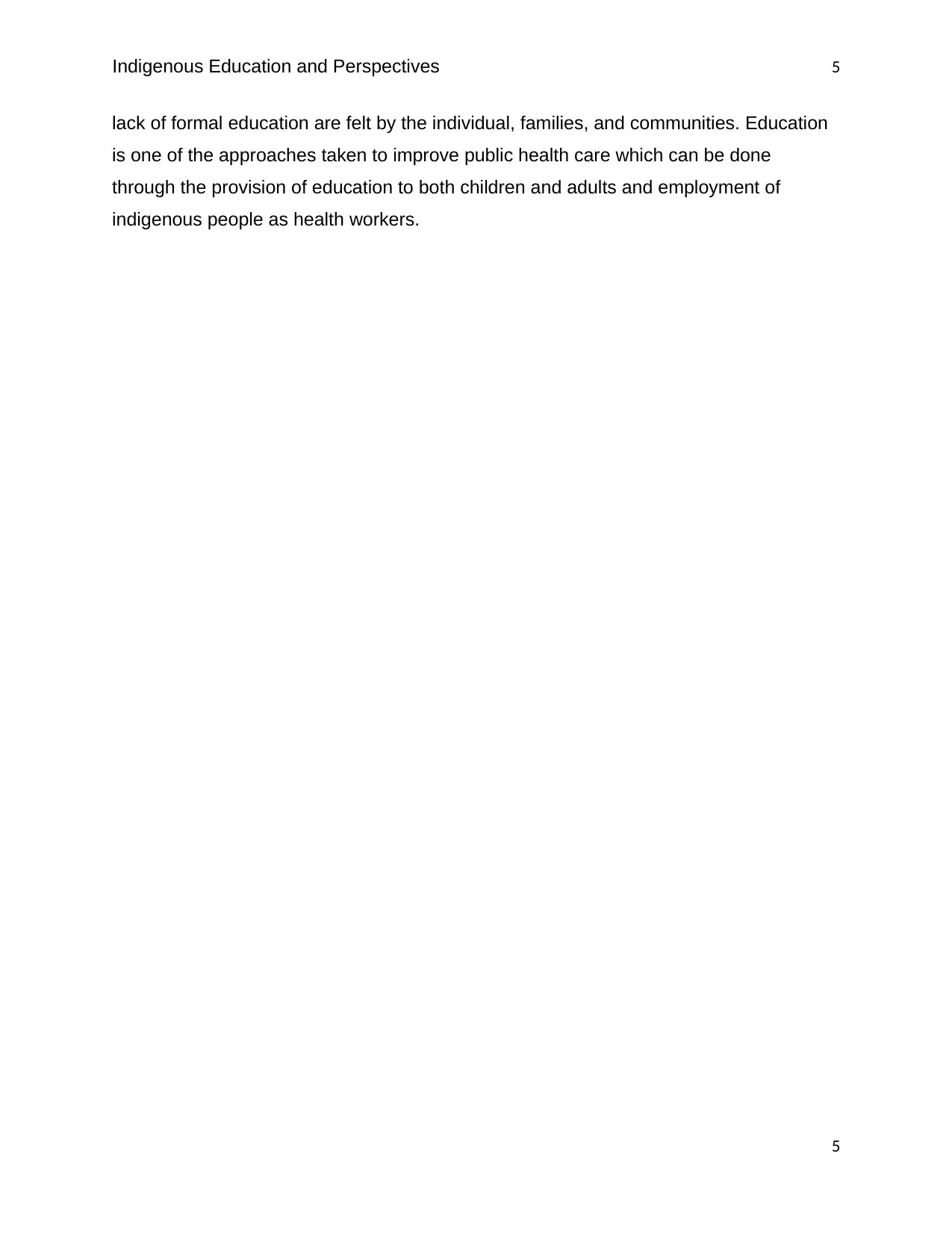
Indigenous Education and Perspectives 5
lack of formal education are felt by the individual, families, and communities. Education
is one of the approaches taken to improve public health care which can be done
through the provision of education to both children and adults and employment of
indigenous people as health workers.
5
lack of formal education are felt by the individual, families, and communities. Education
is one of the approaches taken to improve public health care which can be done
through the provision of education to both children and adults and employment of
indigenous people as health workers.
5
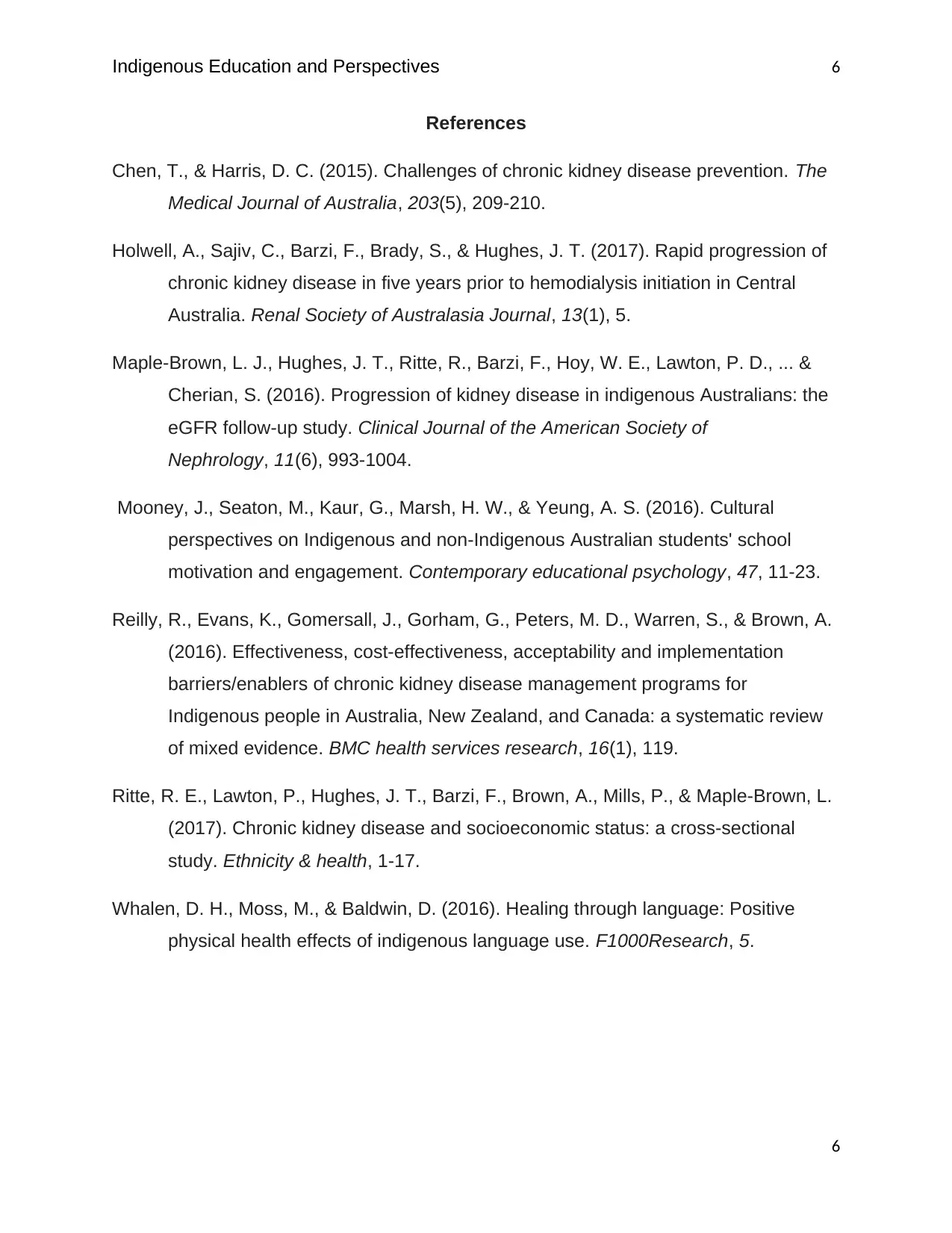
Indigenous Education and Perspectives 6
References
Chen, T., & Harris, D. C. (2015). Challenges of chronic kidney disease prevention. The
Medical Journal of Australia, 203(5), 209-210.
Holwell, A., Sajiv, C., Barzi, F., Brady, S., & Hughes, J. T. (2017). Rapid progression of
chronic kidney disease in five years prior to hemodialysis initiation in Central
Australia. Renal Society of Australasia Journal, 13(1), 5.
Maple-Brown, L. J., Hughes, J. T., Ritte, R., Barzi, F., Hoy, W. E., Lawton, P. D., ... &
Cherian, S. (2016). Progression of kidney disease in indigenous Australians: the
eGFR follow-up study. Clinical Journal of the American Society of
Nephrology, 11(6), 993-1004.
Mooney, J., Seaton, M., Kaur, G., Marsh, H. W., & Yeung, A. S. (2016). Cultural
perspectives on Indigenous and non-Indigenous Australian students' school
motivation and engagement. Contemporary educational psychology, 47, 11-23.
Reilly, R., Evans, K., Gomersall, J., Gorham, G., Peters, M. D., Warren, S., & Brown, A.
(2016). Effectiveness, cost-effectiveness, acceptability and implementation
barriers/enablers of chronic kidney disease management programs for
Indigenous people in Australia, New Zealand, and Canada: a systematic review
of mixed evidence. BMC health services research, 16(1), 119.
Ritte, R. E., Lawton, P., Hughes, J. T., Barzi, F., Brown, A., Mills, P., & Maple-Brown, L.
(2017). Chronic kidney disease and socioeconomic status: a cross-sectional
study. Ethnicity & health, 1-17.
Whalen, D. H., Moss, M., & Baldwin, D. (2016). Healing through language: Positive
physical health effects of indigenous language use. F1000Research, 5.
6
References
Chen, T., & Harris, D. C. (2015). Challenges of chronic kidney disease prevention. The
Medical Journal of Australia, 203(5), 209-210.
Holwell, A., Sajiv, C., Barzi, F., Brady, S., & Hughes, J. T. (2017). Rapid progression of
chronic kidney disease in five years prior to hemodialysis initiation in Central
Australia. Renal Society of Australasia Journal, 13(1), 5.
Maple-Brown, L. J., Hughes, J. T., Ritte, R., Barzi, F., Hoy, W. E., Lawton, P. D., ... &
Cherian, S. (2016). Progression of kidney disease in indigenous Australians: the
eGFR follow-up study. Clinical Journal of the American Society of
Nephrology, 11(6), 993-1004.
Mooney, J., Seaton, M., Kaur, G., Marsh, H. W., & Yeung, A. S. (2016). Cultural
perspectives on Indigenous and non-Indigenous Australian students' school
motivation and engagement. Contemporary educational psychology, 47, 11-23.
Reilly, R., Evans, K., Gomersall, J., Gorham, G., Peters, M. D., Warren, S., & Brown, A.
(2016). Effectiveness, cost-effectiveness, acceptability and implementation
barriers/enablers of chronic kidney disease management programs for
Indigenous people in Australia, New Zealand, and Canada: a systematic review
of mixed evidence. BMC health services research, 16(1), 119.
Ritte, R. E., Lawton, P., Hughes, J. T., Barzi, F., Brown, A., Mills, P., & Maple-Brown, L.
(2017). Chronic kidney disease and socioeconomic status: a cross-sectional
study. Ethnicity & health, 1-17.
Whalen, D. H., Moss, M., & Baldwin, D. (2016). Healing through language: Positive
physical health effects of indigenous language use. F1000Research, 5.
6
⊘ This is a preview!⊘
Do you want full access?
Subscribe today to unlock all pages.

Trusted by 1+ million students worldwide
1 out of 6
Related Documents
Your All-in-One AI-Powered Toolkit for Academic Success.
+13062052269
info@desklib.com
Available 24*7 on WhatsApp / Email
![[object Object]](/_next/static/media/star-bottom.7253800d.svg)
Unlock your academic potential
Copyright © 2020–2025 A2Z Services. All Rights Reserved. Developed and managed by ZUCOL.





